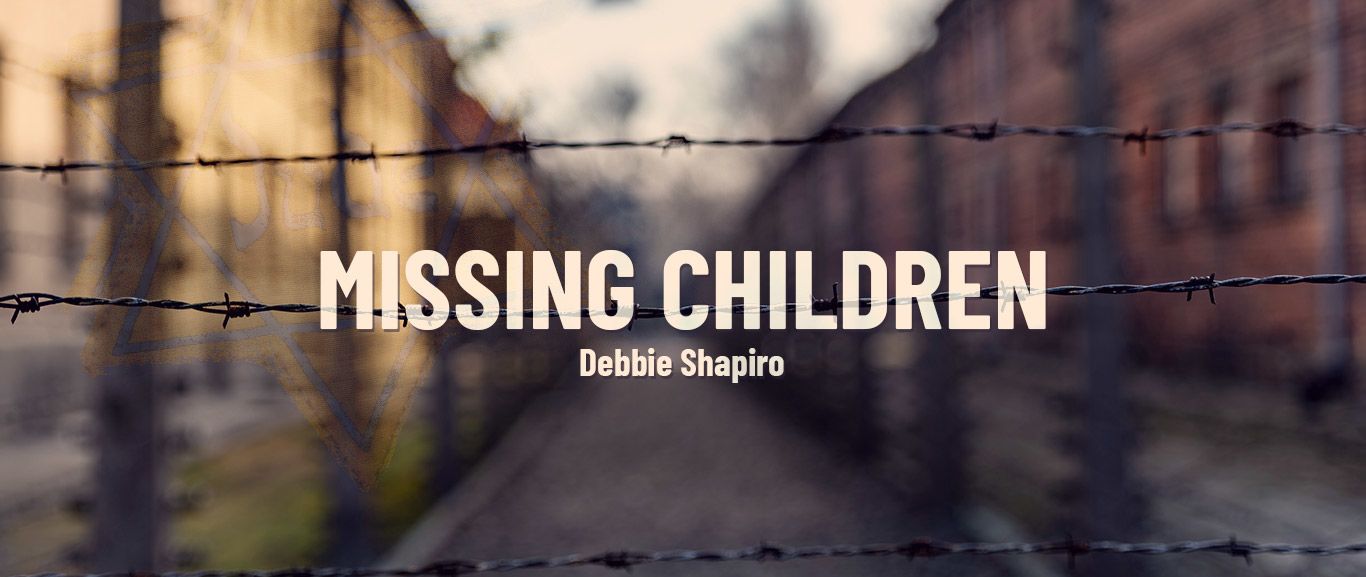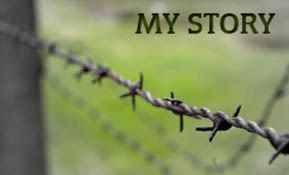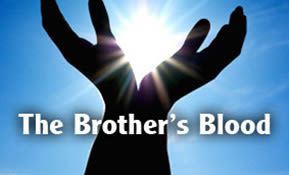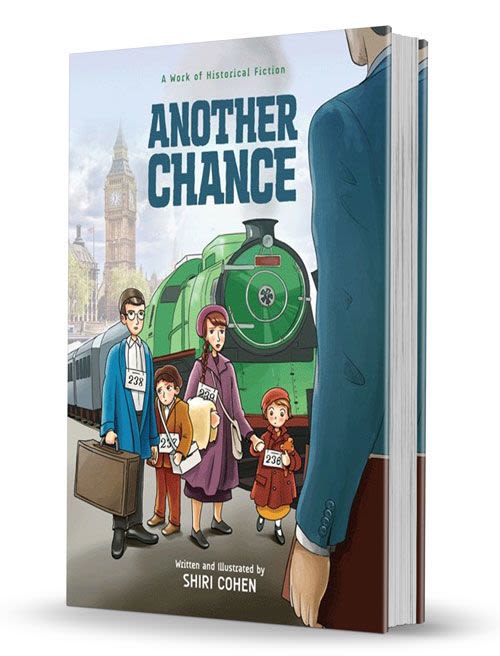
Missing Children
Holocaust Day: 06-May-2024. Prior to the holocaust approximately 1.6 million Jewish children were living in Nazi occupied Europe. An estimated 1.5 million of them were murdered...

Prior to the holocaust approximately 1.6 million Jewish children were living in Nazi occupied Europe. An estimated 1.5 million of them were murdered during the holocaust.
Just sixty years ago, hundreds of Jewish parents were faced with the challenge of reuniting with their children who had remained hidden with non-Jewish families during the War. “In my interviews with hidden children,” writes Bloeme Evers-Emden, Ph.D. a holocaust researcher presently residing in Holland and author of three books about the Hidden Children, “ I found in two-thirds of the cases that the damaged relationship was never repaired… Some doubted that their parents were their real parents. Some had loyalty conflicts between their foster and biological parents.”
Children in the Holocaust
Prior to the holocaust approximately 1.6 million Jewish children were living in Nazi occupied Europe. An estimated 1.5 million of them were murdered during the holocaust. Since almost no children survived the concentration camps, most of the surviving children either escaped to one of the unoccupied countries or went into hiding.
In every European country under German occupation, the survival rate of children was much lower than that of the overall Jewish population. Thus, prewar Poland had an estimated 1 million Jewish children. Of these children, ranging from infancy to age 14, only an estimated 5,000, or half a percent, survived.
In Holland, Jews made up 1.6 percent of the Dutch population. Of the 140,000 Dutch Jews, an estimated 75 percent perished. Among the 35,000 survivors, only 3,500 were children.
Of the 65,000 Belgian Jews, about 40 percent survived, among them 3,000 children.
Out of 350,000 French Jews, an estimated 90,000, or 26 percent, were killed. Figures for child survivors range from 5,000 to 15,000. Most of them were orphans.
Most countries, among them Belgium, Holland and Poland, had special sections of the underground devoted to saving Jewish children. Frequently, these special sections were run jointly by Jews and Christians. There were also convents, monasteries and orphanages that tried to save Jewish children, although many of them were really more interested in “saving” Jewish souls for Christianity. Some of these religious institutions were connected to the resistance while others acted independently.
The Tribulations of Separation
Researchers have found that when children are separated without having contact from their parents the result is irreversible estrangement. This was especially true with hidden children since even the very youngest among them realized that their lives were at stake and therefore made sure to adapt quickly to their new surroundings. Very often, they could not allow themselves the luxury of crying since they were afraid that their new family would reject them, or even worse, hand them over to the authorities. It was only after the war that they allowed themselves to express their emotions. “It was very difficult for us to get used to becoming one family other after the War,” explains one of those children. “My mother was having her own difficulties coping with what she had gone through, and in addition she had to get used to four children who she really didn’t know, and since they were traumatized by what they had gone through, they were extremely problematic. And yet, in the overall picture, we were the lucky ones.”
In addition to obtaining an entirely new identity, the hidden children had to become familiar with Christianity in order to survive. Anyone suspected of being Jewish was subjected to rigorous cross-examinations and failure to pass such a test usually lead to death.
Forced to give up their childhood at an early age, the hidden children had to be flexible,” writes Nechama Tec in Historical Background of the Hidden Children. “An important part of this flexibility was obedience. Under no circumstances could we antagonize those who were protecting us…We were not supposed to cry. We did not, at least not in front of others. We had to be grateful for what others were doing for us…Our daily existence was also tied to two other basic requirements: giving up our Jewish identity and being silent… Sometimes we were so caught up in the new part that we actually forgot who we really were. This was temporary. Though helpful, this forgetfulness was emotionally costly. For many of us, giving up our true identity created an emotional void. It made us feel anxious, anxious that we might never recapture our past. We also felt guilty, ashamed that we were giving up what had been cherished by our parents, by those we loved.”
Many of the children were never able to come to terms with their double existence. Zoe, for example, was hidden in small French farming village during the War. Her father survived, but her mother perished in one of the concentration camps. Although she was reunited with her father, the family unit was never reestablished. Zoe later denied her Jewish identity and married a Catholic. She raised her three children as Catholics. Neither her husband or children realized that she was Jewish.
Many years later, one of Zoe’s sons traveled to Israel and felt so much at home that he decided to remain. Consequently, Zoe told her family that she was Jewish. Her husband divorced her, but her children were delighted and immediately declared themselves Jews. Today, Zoe and her children live in Paris and are an integral part of the Jewish community there. For Zoe, it took over half a century to finally make peace with her experience and “come home.”
Many of the hidden children were so integrated into their adopted families that they had no inkling that they were Jewish. It is only today, at death bed confessions, that many of these children, who are now in their late sixties or seventies, are learning the truth about themselves. It is so traumatic that in 1990 a special organization, The Association of the Hidden Children of the Holocaust was established in Warsaw to assist these “hidden children” in coping with their identity crisis. Originally number only four “hidden children,” the organization has grown until today it has consists of over 800 members
The Director, Elzbieta Ficowska, herself a “new Jew”, says its members often need therapy to cope with their changed identity so late in life. She adds that many of these hidden children will go to their graves without ever finding out the truth.
Romuald Jakub Weksler-Waskinel, for example, is a Catholic priest who only recently found out that his real parents had been sent to the death camps. “It was like being born again,” he explains with tears in his eyes. Upon learning about his true origins, he found himself not only mourning the deaths of his Jewish parents and brother, but also the loss of his Jewish identity, a loss that, sadly to say, will never be recovered.
As the Generation of the Holocaust Ages
As the generation of the holocaust is becoming older, more and more of these hidden children are publicizing their stories. It is important to emphasize that the stories mentioned below are unusual. The vast majority of families hiding Jewish children tried to estrange them from their religion.
Rivka, a well-known educator, is often asked to speak at schools and camps about her experiences during the War. She speaks about her adopted family in glowing terms. “The woman who took care of me was a very religious Protestant. She had a deep belief in G-d and wonderful middot. In her own way, she taught me to have yirat Shemayim (fear of heaven) and educated me to believe in G-d. Years later, I asked her why she had endangered her life by hiding a Jewish child. She explained that she loves G-d and has learned the Bible thoroughly. She had learned that God loves the Jews and she wanted to give Him nachat ruach (gratification) by saving His chosen people.”
Hem chashvu l’ra’ah, v’HaElokim chashva l’tova (They planned for evil, but Hashem planned for good). In spite of the spiritual danger of being raised in a non-Jewish home, in this particular situation, hashgachah pratit (Divine Providence) – and, I am sure, the heartfelt prayers of Rivka’s parents – assured that the results were positive.
Rivka has no recollection of leaving her parents and going into hiding. “I was only three years old when my parents informed me that I would be going on an outing. I spent that first night at the home of a girl from the Dutch underground, and the following day the girl took me by train to a small town in northern Holland where an unmarried Dutch woman was waiting for me.”
The Dutch woman was a devoted mother and Rivka has no recollection of wanting to return home to her real family. “We were four children, and we all survived through hiding with non-Jewish families. My parents came to visit me immediately after the War, when I was five years old. I had no idea who they were. My parents, however, waited another half a year before taking me back to their home. When the War was over they were left with nothing. They had no house, no place to put me. Before bringing me back home, they had to organize their own lives, find some way to earn a livelihood.
“It was very difficult for them to make the trip to visit me. The village was far from Amsterdam, and in those days, there were no trains. They rode broken bicycles across the country to see me. I have no recollection of coming home. I don’t know if I was cried or if I was happy.”
Was it very difficult to readjust to your own family? “My parents were very smart and knew how to handle the situation. When I first came home, for example, I would pray like a Christian, but my parents did not try to stop me. Instead, they taught me how to be Jewish, until eventually I stopped on my own,” says Rivka. “But there were others who found it extremely difficult to readjust to their own families, and still carry the scars with them today.”
Rivka’s family encouraged her to remain in contact with her foster mother. “Until I moved to Eretz Yisroel in 1959, I would visit her every summer. At first, I would stay there for a full month, but when I was bigger, I would go for just a week. She respected my religious beliefs and even bought special dishes for me to use whenever I came to see her. She would come to visit me each year on my birthday and we viewed her as our honored guest. After all, she had saved my life. In those days, there were no telephones so we corresponded regularly. Since she never had any children of her own, she thought of me as her daughter.
“We continued to correspond even after I moved to Eretz Yisroel. Before this wonderful woman passed away, she put aside her gold watch and ring for me, and when she was niftar, I traveled to Holland to attend her funeral.”
Sylvia* was also hidden by a Dutch family during the War. “I was with five families before I finally came to the last family. Their home was a virtual gan eden (Garden of Paradise). They took wonderful care of me and loved me dearly. I remember my foster father taking me on his knees and preparing me for the different future possibilities– that my parents might never return, or that only one of them might come back. This family hid nine Jews, and in addition there were always Jews staying with them temporarily. The woman’s father had taught her that every human being, including Jews, have a right to live.
“Before the War, my adopted mother worked as a maid for a Jewish family and noticed that the parent study parshat hashavua (weekly Torah portion) with their children. They explained to her that they were studying the Bible. So every day she made a point of studying Tanach with me since she knew that that was what Jews do. We started with sefer Bereishit and by the time the War was finished, when I was seven years old, we were up to Divrei Hayamim.”
Sylvia remained in contact with her foster parents even after moving to Eretz Yisroel. “They came to visit me in Israel 23 times, and when they were older, and my children were older, I traveled to see them in Holland.”
Rabbi Binyamin* is a well known marbitz Torah living in Yerushalayim. He was only three years old when he was handed over to the Dutch underground. “My parents never returned,” says Rabbi Binyamin. “I don’t remember anything about my real family.”
Rabbi Binyamim owes his life to one brave young woman from the Dutch underground, Anna*. “My parents decided to volunteer for what they were told would be a labor camp in Germany, and of course they wanted to take me along. Anna, who had once worked for my father and was now active in the Dutch underground, begged my parents to go into hiding instead. Eventually, they agreed. It was too difficult, however, to hide the three of us together, so I was placed with a different family.
“My parents were hiding for a about a year until they were caught. Since I looked so obviously Jewish, I was constantly being transferred from one home to the next. All in all, I stayed with fifteen different families. Anna was in charge of the welfare of 33 children that were hiding with Dutch families. She obtained food for us, which was very difficult since legally we did not exist and everything was carefully rationed. In addition, she had to constantly find a way to transfer us to a different “safe house” when things began to look dangerous.
“Since Anna worked full time and devoted her evenings and weekends to the underground, she had very little time for herself. One evening, however, she had some free time and decided to relax with a book. But she was unable to concentrate. For some inexplicable reason, she could not stop worrying about my welfare. Finally, she got on her bike and cycled to the house where I was hiding. This in itself was dangerous, since it was after curfew.
“At the time, I was living in the home of a woman who had no children and whose husband had been sent to forced labor in Germany. That morning, her neighbor, a Dutch Nazi, knocked on her door and started asking about me. The woman told her that I was her nephew and that since her sister was in the hospital, I had come to stay with her. She realized, however, that the Dutch Nazi was suspicious and was worried about my welfare.
“Anna agreed that this was definitely cause for concern and immediately smuggled me out of there. That evening I slept in a dormitory and the next day I was placed with a different family. The Nazi woman returned the next day, but by then I was already gone.
“Anna could not understand why she had felt such a strong desire to see how I was doing. After all, she had come to check on me a few days prior to that incident.”
Anna felt that remaining in contact with the children that she had saved would just remind them of the tragic period they had gone through. As a result, Rabbi Binyamin lost contact with her for close to forty years. Eventually, however, he renewed contact and invited her to his daughter’s wedding. “I traveled to visit her several times in Holland and a tree was planted in her honor in Yad V’Shem. Anna and I had many discussions about our experiences, and I explained to her that that overwhelming feeling that caused her to endanger herself to see if I was alright was really what we call Divine Providence. She passed away about five years ago.”
Many of the hidden children, however, had horrible experiences. “Our parents placed us in an orphanage kept by the evangelic pastorate in Modra and, without disclosing their location, they too went into hiding,” writes Chava Kolar in ‘A Loner in a World Filled with Others.’ “I was desperate with grief. I tried, unsuccessfully, to persuade myself of the necessity of being left in this horrible institution, a place where the nuns beat children for any tiny offense, and where I had to pretend to be someone else. How could my dear parents have done such a thing to me?
“I developed a constant fear of people and tried to avoid contact with them. I was confused, angry, and infinitely sad. Not quite comprehending the cause of my circumstances, I became distrustful of the whole world and of every person in it.”
Chava continues, “And yet I was, in a way, lucky. The Filus family in Vrbovce kept my parents safe in a hole in their barn and the Derer pastor in Modra did not disclose our hiding place to the authorities, despite mortal danger to himself and to his family. And after the war, our little family of four reunited, later made aliyah and started a new life. None of us was ever quite the same, but we were alive.”
“When I was given away, I felt severed from my family like a tree from its roots,” writes Lillian Boraks-Nemetz in her article ‘Severed, Like a Tree from Its Roots.’ “I felt neglected and forsaken. As a child of nine, I did not understand that my parents would not be willfully separated from their children unless it was a matter of life and death. Instead, the feeling of having been abandoned entered my psyche and stayed there.”
It will take many more years for us to fully comprehend the horrors of the holocaust. Those who survived remained scarred for life, and today, the second and third generation are still feeling the affects by these scars.







5/05/2024
Heartache of a broken nation. We can only trust that there is a greater reason for these millions sparks of exile.
7/07/2019
I know a lot of people who have the same past, same experiences. Hearing from family on their death beds, that they are actually jewish, or that their parents were. Testemonies from first or second hand. There is a lot broken that needs to be healed, nerds to be fixed. I've been also told by different jewish people, I am jewish my self. I can not ask my grandparents and my parents Will shake their heads or leave a door open for maybe.. By time HaShem wil uncover the veil.